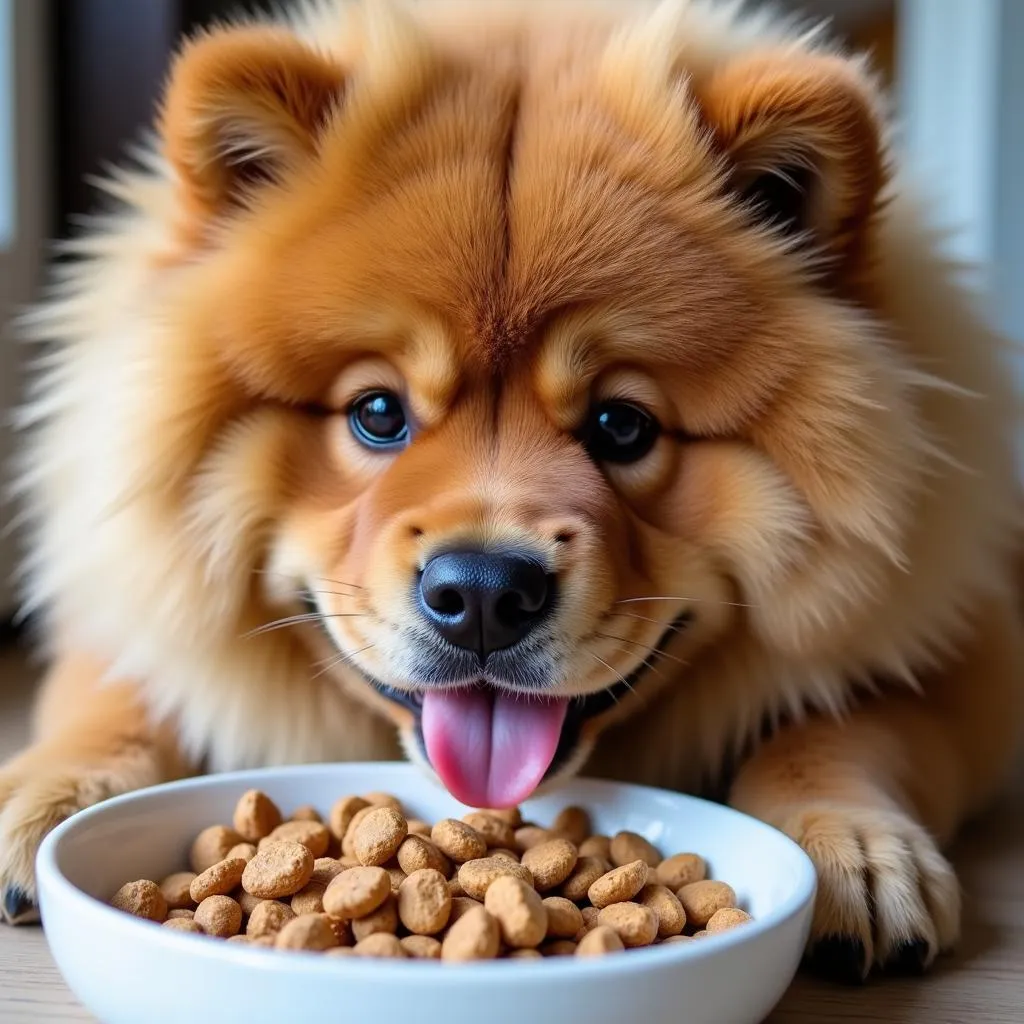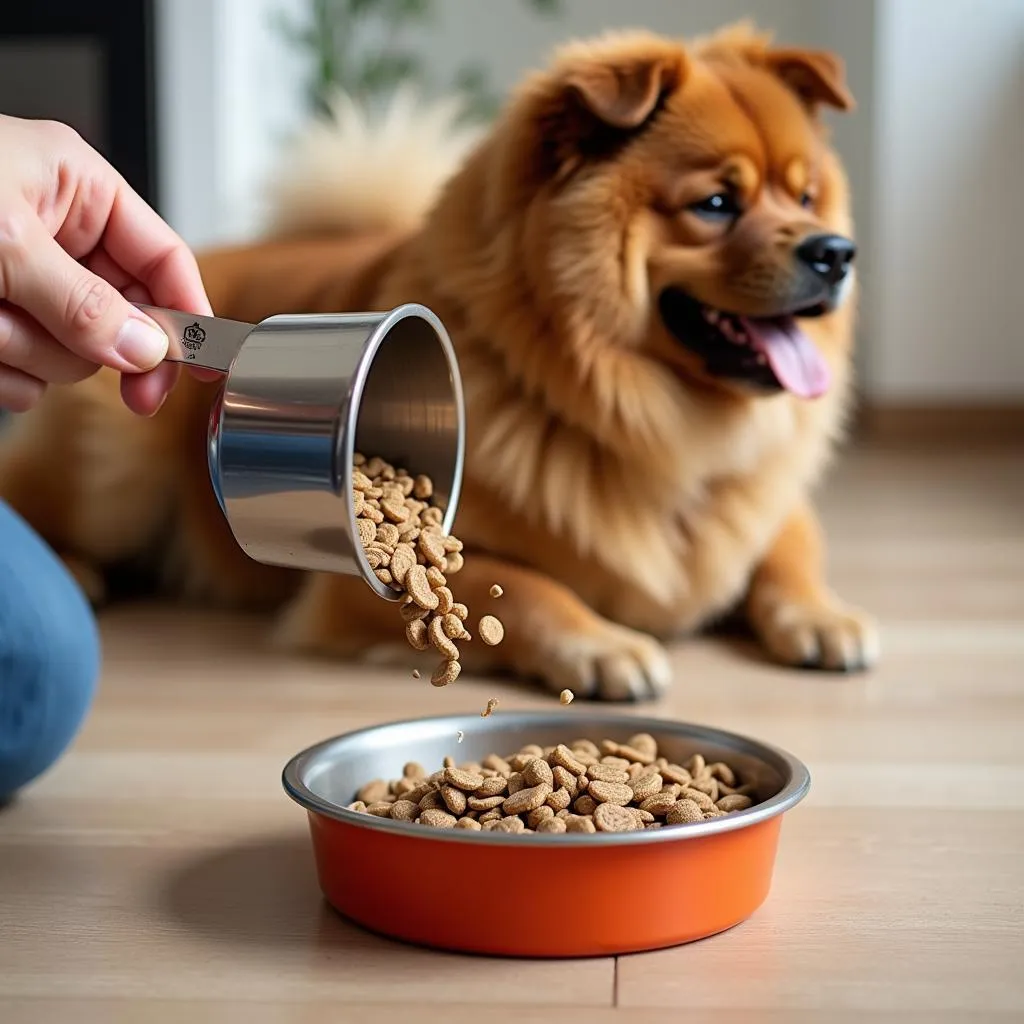Chow Chows, with their distinctive blue-black tongues and lion-like manes, are a unique and ancient breed. As with any breed, providing them with the right diet is crucial for their overall health and well-being. But navigating the world of Chow Chow Dog Food can be confusing. What are the best options for their specific needs? How much should you feed them? This guide will delve into everything you need to know about choosing the best food for your chow chow, ensuring they live a long, happy, and healthy life.
Understanding Your Chow Chow’s Dietary Needs
Chow Chows are considered a medium-sized breed, but they can be prone to certain health issues like hip dysplasia and joint problems. This makes it essential to choose a diet that supports their bone and joint health. Additionally, their thick double coat requires specific nutrients for optimal condition.
 Chow Chow enjoying a meal from a bowl
Chow Chow enjoying a meal from a bowl
Here’s a breakdown of the key nutrients your Chow Chow needs:
- Protein: As carnivores at heart, dogs thrive on protein. Look for high-quality protein sources like chicken, fish, or lamb as the primary ingredient in your chow chow’s food.
- Fat: Fat provides energy and supports healthy skin and a shiny coat. Choose foods with healthy fats like chicken fat or fish oil.
- Glucosamine and Chondroitin: These are crucial for maintaining healthy joints, especially important for chow chows who are predisposed to joint problems.
- Omega-3 Fatty Acids: These support healthy skin, a shiny coat, and reduce inflammation.
- Fiber: A moderate amount of fiber aids in digestion and helps your chow chow feel full and satisfied.
Types of Chow Chow Dog Food
With countless dog food options available, choosing the right one can feel overwhelming. Here are the most common types:
Dry Kibble
Dry kibble is a popular choice due to its affordability and convenience. Look for high-quality kibble with a meat-based protein as the first ingredient.
Pros:
- Affordable
- Convenient to store
- Helps clean teeth
Cons:
- Can be less palatable than wet food
- May contain more fillers and artificial ingredients
Wet Food
Wet food, typically found in cans or pouches, has a higher moisture content and can be more appealing to picky eaters.
Pros:
- More palatable for some dogs
- Higher moisture content can benefit dogs who don’t drink enough water
Cons:
- More expensive than dry kibble
- Can be messy
- Doesn’t last as long once opened
Raw Food
Raw food diets consist of uncooked meat, bones, fruits, and vegetables.
Pros:
- Mimics a dog’s natural diet
- May result in a shinier coat and healthier skin
Cons:
- Can be expensive and time-consuming to prepare
- Potential for bacterial contamination if not handled properly
How Much to Feed Your Chow Chow
The amount of food your Chow Chow needs depends on several factors, including age, activity level, and metabolism. Always refer to the feeding guide on your chosen dog food for general guidelines.
 Measuring out food for a Chow Chow
Measuring out food for a Chow Chow
- Puppies: Chow Chow puppies need more frequent meals than adults. Feed them three to four times a day to support their rapid growth.
- Adults: Most adult Chow Chows do well on two meals per day.
- Seniors: As Chow Chows age, their metabolism may slow down. Adjust their food intake as needed to prevent weight gain.
Remember to consult your veterinarian to determine the optimal feeding amount for your Chow Chow’s individual needs.
Food Allergies in Chow Chows
Like all breeds, Chow Chows can suffer from food allergies. Common allergens include beef, dairy, wheat, and soy. If you notice symptoms like itching, skin irritation, vomiting, or diarrhea, consult your veterinarian. They can help determine if your Chow Chow has a food allergy and recommend an appropriate diet.
Tips for a Healthy Chow Chow Diet
- Choose high-quality food: Always prioritize quality ingredients and look for food that meets the nutritional standards set by the Association of American Feed Control Officials (AAFCO).
- Avoid overfeeding: Chow Chows are prone to obesity, so monitor their weight and adjust their food intake as needed.
- Provide plenty of fresh water: Ensure your Chow Chow has access to fresh, clean water at all times.
- Make gradual food transitions: When switching to a new food, do it gradually over several days to prevent digestive upset.
- Consult your veterinarian: Regularly check in with your veterinarian to discuss your Chow Chow’s diet and overall health.
Conclusion
Feeding your Chow Chow a nutritious and balanced diet is essential for their well-being. By understanding their unique needs and choosing high-quality food, you can help your furry friend live a long, healthy, and happy life. Remember, every dog is different, so what works for one Chow Chow might not work for another. Always consult your veterinarian to determine the best dietary plan for your individual companion.
FAQ
1. What kind of food is best for a Chow Chow puppy?
Chow Chow puppies need a diet rich in protein, fat, and essential nutrients to support their rapid growth. Look for puppy-specific formulas with high-quality ingredients.
2. Can Chow Chows eat grains?
While Chow Chows can digest grains, some may be sensitive to certain types like wheat or corn. Opt for grain-free options or those containing easily digestible grains like rice or oatmeal.
3. Are raw bones safe for Chow Chows?
Raw bones can pose a choking hazard or cause dental damage. If you choose to feed bones, always supervise your Chow Chow and select appropriately sized options.
4. My Chow Chow is overweight. What should I do?
If your Chow Chow is overweight, consult your veterinarian. They can recommend a weight loss plan that may include dietary changes and increased exercise.
5. How can I transition my Chow Chow to a new food?
Gradually introduce the new food over several days, mixing it with their current food in increasing amounts. This will help prevent digestive upset.
For more helpful tips and tricks on throwing the best paw patrol birthday party food ideas, check out our other blog posts!
If you have any further questions or concerns about your Chow Chow’s diet, don’t hesitate to contact us. Our team is here to help!
Phone Number: 02437655121
Email: minacones@gmail.com
Address: 3PGH+8R9, ĐT70A, thôn Trung, Bắc Từ Liêm, Hà Nội, Việt Nam.